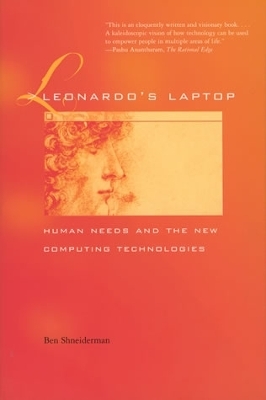
Leonardo's Laptop
Human Needs and the New Computing Technologies
Seiten
2003
MIT Press (Verlag)
978-0-262-69299-1 (ISBN)
MIT Press (Verlag)
978-0-262-69299-1 (ISBN)
- Keine Verlagsinformationen verfügbar
- Artikel merken
Using the inspiration of Leonardo da Vinci to build a new, humanistic computing that focuses on users' needs and goals.
Ben Shneiderman's book dramatically raises computer users' expectations of what they should get from technology. He opens their eyes to new possibilities and invites them to think freshly about future technology. He challenges developers to build products that better support human needs and that are usable at any bandwidth. Shneiderman proposes Leonardo da Vinci as an inspirational muse for the "new computing." He wonders how Leonardo would use a laptop and what applications he would create.
Shneiderman shifts the focus from what computers can do to what users can do. A key transformation is to what he calls "universal usability," enabling participation by young and old, novice and expert, able and disabled. This transformation would empower those yearning for literacy or coping with their limitations. Shneiderman proposes new computing applications in education, medicine, business, and government. He envisions a World Wide Med that delivers secure patient histories in local languages at any emergency room and thriving million-person communities for e-commerce and e-government. Raising larger questions about human relationships and society, he explores the computer's potential to support creativity, consensus-seeking, and conflict resolution. Each chapter ends with a Skeptic's Corner that challenges assumptions about trust, privacy, and digital divides.
Ben Shneiderman's book dramatically raises computer users' expectations of what they should get from technology. He opens their eyes to new possibilities and invites them to think freshly about future technology. He challenges developers to build products that better support human needs and that are usable at any bandwidth. Shneiderman proposes Leonardo da Vinci as an inspirational muse for the "new computing." He wonders how Leonardo would use a laptop and what applications he would create.
Shneiderman shifts the focus from what computers can do to what users can do. A key transformation is to what he calls "universal usability," enabling participation by young and old, novice and expert, able and disabled. This transformation would empower those yearning for literacy or coping with their limitations. Shneiderman proposes new computing applications in education, medicine, business, and government. He envisions a World Wide Med that delivers secure patient histories in local languages at any emergency room and thriving million-person communities for e-commerce and e-government. Raising larger questions about human relationships and society, he explores the computer's potential to support creativity, consensus-seeking, and conflict resolution. Each chapter ends with a Skeptic's Corner that challenges assumptions about trust, privacy, and digital divides.
Ben Shneiderman is Professor of Computer Science and Founding Director (1983- 2000) of the Human-Computer Interaction Laboratory at the University of Maryland, College Park.
| Reihe/Serie | Leonardo's Laptop |
|---|---|
| Zusatzinfo | 40 illus. |
| Verlagsort | Cambridge, Mass. |
| Sprache | englisch |
| Maße | 152 x 229 mm |
| Gewicht | 386 g |
| Themenwelt | Informatik ► Software Entwicklung ► User Interfaces (HCI) |
| ISBN-10 | 0-262-69299-6 / 0262692996 |
| ISBN-13 | 978-0-262-69299-1 / 9780262692991 |
| Zustand | Neuware |
| Haben Sie eine Frage zum Produkt? |
Mehr entdecken
aus dem Bereich
aus dem Bereich
Aus- und Weiterbildung nach iSAQB-Standard zum Certified Professional …
Buch | Hardcover (2023)
dpunkt Verlag
34,90 €
Lean UX und Design Thinking: Teambasierte Entwicklung …
Buch | Hardcover (2022)
dpunkt (Verlag)
34,90 €
Wissensverarbeitung - Neuronale Netze
Buch | Hardcover (2023)
Carl Hanser (Verlag)
34,99 €


